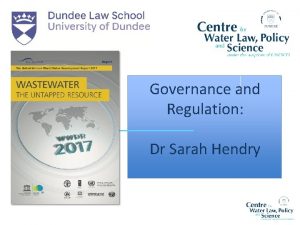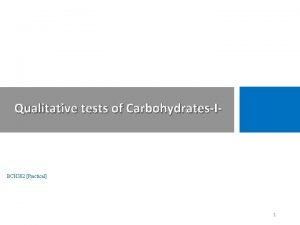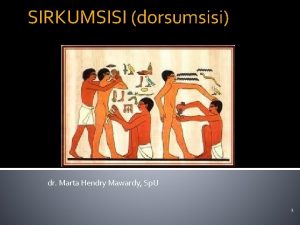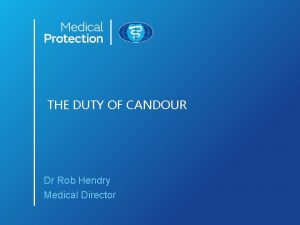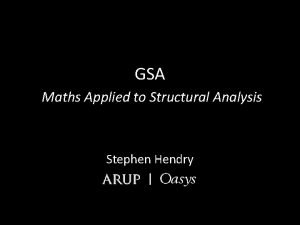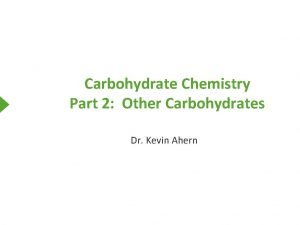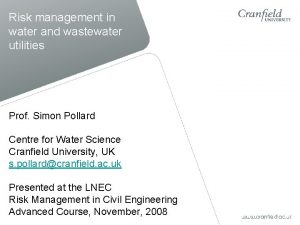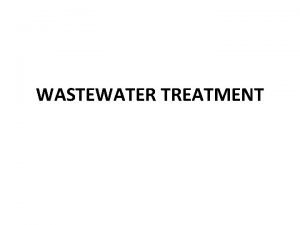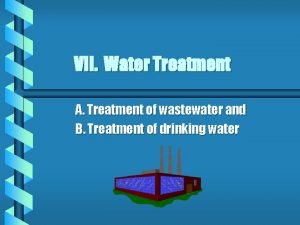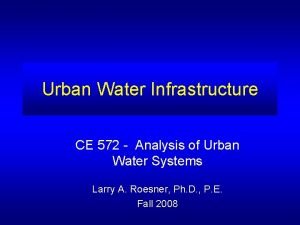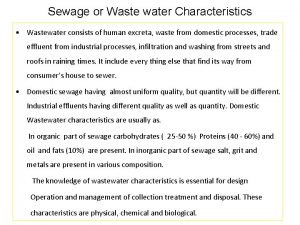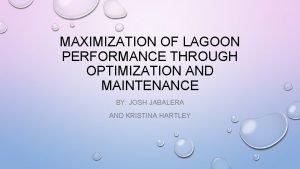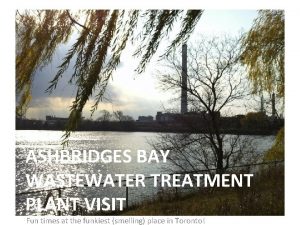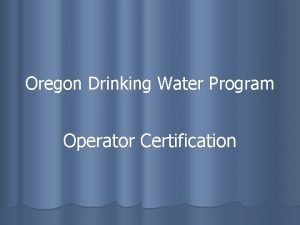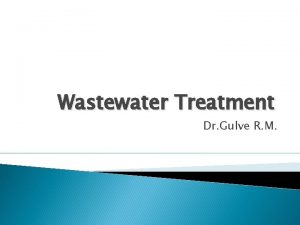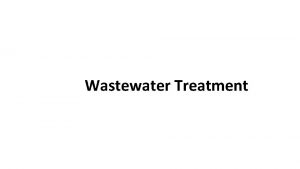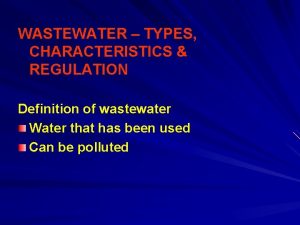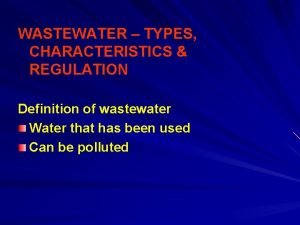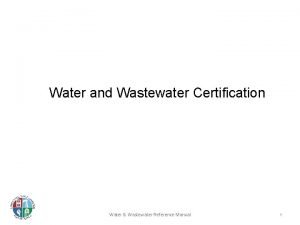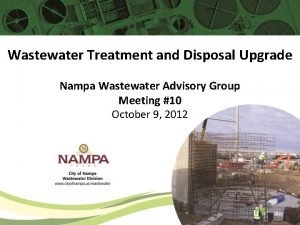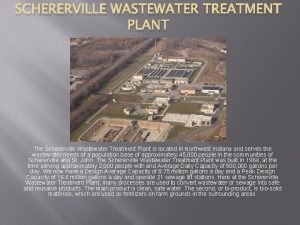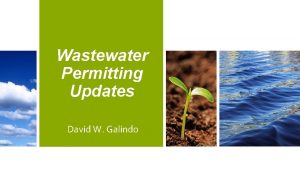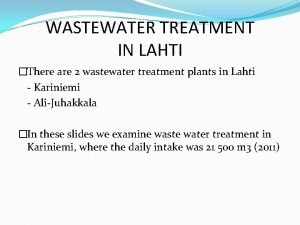Governance and Regulation Dr Sarah Hendry REDUCING WASTEWATER



















- Slides: 19

Governance and Regulation: Dr Sarah Hendry

REDUCING WASTEWATER: REMOVING BURDEN REUSING VALUABLE RESOURCE RECOVERING v v Not a but a v v

Definitions Wastewater or effluent: • domestic effluent (blackwater / greywater); water from commercial premises; industrial effluent; stormwater and other urban runoff; and agricultural, horticultural and aquaculture runoff Blackwater: • generated from the toilet. . . contains urine, faeces, flushwater and/or toilet paper. Greywater: • generated from a washing machine, bathtub, shower or bathroom sink … Recycled (or Reclaimed) water: • Treated (‘fit-for-purpose’) wastewater that can be used under controlled conditions for beneficial purposes within the same establishment or industry (or for irrigation) Water reuse/wastewater use: • Use of untreated, partially treated or treated wastewater

Context 800 m people lack ‘improved’ DW; 1. 6 bn may lack safe DW; 2. 6 bn still lack even basic sanitation Est 850, 000 deaths directly caused by inadequate water services yearly, including 360, 000 under 5’s. >99% water, and <1% waste Wastewater widely used for agriculture / aquaculture Energy and nutrients… >80% of WW globally is not treated Return on investment is $5. 5 / $1 spend

Consumption and WW Production 4000 km 2 water abstracted annually; 44% consumed 56% -> WW Source: WWDR 2017; Based on data from AQUASTAT (n. d. a. ); Mateo-Sagasta et al. (2015); and Shiklomanov (1999). Contributed by Sara Marjani Zadeh (FAO).

Sustainable Development Goals Goal 6 – all aspects of water: DW; sanitation; water management; transboundary cooperation; Target 6. 3: By 2030, improve water quality by reducing pollution, eliminating dumping and minimizing release of hazardous chemicals and materials, halving the proportion of untreated wastewater and substantially increasing recycling and safe reuse globally

Law, Policy, Governance International, regional, national, local Actors and Roles Powers and Duties; Rights and Liabilities Definitions Treatment options Standard-setting Water reuse Waste management Economic regulation Stakeholder engagement User perceptions

Policy-making and Implementation

International Law • UN Convention on Non-Navigational Uses of International Watercourses – Customary Law – Regional Agreements • Multi-lateral Environmental Agreements – Chemicals, waste • UNECE (Helsinki) Convention Transboundary Watercourses & International Lakes – UNECE / WHO Protocol on Water and Health

Protecting the Danube and the Black Sea Europe’s second longest river, draining water from 19 states into the Black Sea. Cooperation through transboundary, regional and national laws. Investment portfolio of nearly 500 projects, worth over US$5 billion International Commission -> Participation Strategy; Funding through the Global Environment Facility. Since 2010, the Budapest Central Wastewater Treatment Plant treats 95% of the wastewater from Budapest, recovering nutrients and energy. See www. icpdr. org/main/danube-basin

EU Law - Waste / Land EU waste policy and ‘circular economy’ • Closing loops, recovering resources Framework Directive • ‘ 3 R’s’ – reduce, recycle, reuse on Waste • precautionary and polluter pays principles (2008/98/EC) Solid waste legislation highly relevant Directive on sewage sludge in agriculture • non-waterborne sanitation • management of sludge. • 1986…

EU law – Water Framework Directive • • Water quality / ecosystems Surface and groundwater Cost recovery for water services Authorisation of discharges Urban Waste Water Treatment Directive • collection and primary treatment p. e. >2, 000 • biological (secondary) treatment p. e. • > 10, 000 • Sensitive waters -tertiary treatment EU Priority Substances Directive • ‘Emerging’ pollutants • Solvents, heavy metals, pesticides • 33 substances, 2008; extended to 45, 2013

Resource Recovery Energy • Biogas • Heating / cooling • Electricity generation • On-site sludge / biosolids • Reduce energy consumption, carbon Nutrients • N, P cause eutrophication • Phosphates increasingly expensive to mine • Urine contains 88% of the P and 60% of the N in human waste • Human waste could provide 22% of global P demand

Water Reuse Industrial wastewater • large businesses at the forefront Agricultural drainage • source of GW recharge; • basin-wide / IWRM type approach Water cascades Municipal use for nondrinking water Greywater use • using successively for less high quality • may depend on geography • eg parks, public spaces • newbuild; retrofit? • Building regs? Plumbers? Reuse for drinking, food production • most sensitive Price v price of raw water? • Externalities…

Water Reuse (2) WHO guidelines on use of wastewater, greywater, excreta Widely used in agriculture and aquaculture – may / not be adequate safeguards Safety of users and consumers ‘Yuck’ factor

Water Reuse – the EU • Standards for water reuse / water efficiency in buildings? • EU considering legislation – – 8 MS use reclaimed water commonly – 6 have domestic standards, 2 in development • Competition / free movement

Water Reuse for DW Use WW to recharge GW or return to surface waters for mixing with DW sources Issues of acceptability; and standards of WW treatment High level treatment then out to sea is waste!

Conclusions Worldwide –make provision for the poorest – nonwaterborne, basic facilities; small-scale / onsite; Whilst also developing at cutting-edge, managing ‘new’ pollutants, water efficiency; Brexit – free movement, trade – what rules? Brexit – environmental law, UWWTD, water reuse – future investment / technical standards? Reduce; Remove; Reuse; Recover – huge opportunities for innovation, resource recovery, water reuse.

Thank you! Questions and Comments Welcome
 Dr sarah hendry
Dr sarah hendry Glycogen reducing end
Glycogen reducing end Molisch test reaction
Molisch test reaction Reducing sugars vs non reducing sugars
Reducing sugars vs non reducing sugars Perbedaan sirkumsisi dan dorsumsisi
Perbedaan sirkumsisi dan dorsumsisi Dr rob hendry
Dr rob hendry Stephen hendry model
Stephen hendry model Reducing vs non reducing sugar
Reducing vs non reducing sugar Risk management for water and wastewater utilities
Risk management for water and wastewater utilities Wastewater treatment purpose
Wastewater treatment purpose Aquaculture wastewater characteristics
Aquaculture wastewater characteristics Wastewater treatment process primary secondary tertiary
Wastewater treatment process primary secondary tertiary Wastewater distribution system
Wastewater distribution system Typical composition of untreated domestic wastewater
Typical composition of untreated domestic wastewater Physical characteristics of sewage
Physical characteristics of sewage Optimize wastewater lagoon
Optimize wastewater lagoon Ashbridges bay water treatment plant
Ashbridges bay water treatment plant Oregon drinking water program
Oregon drinking water program Peak hourly flow wastewater
Peak hourly flow wastewater Municipal wastewater treatment
Municipal wastewater treatment
